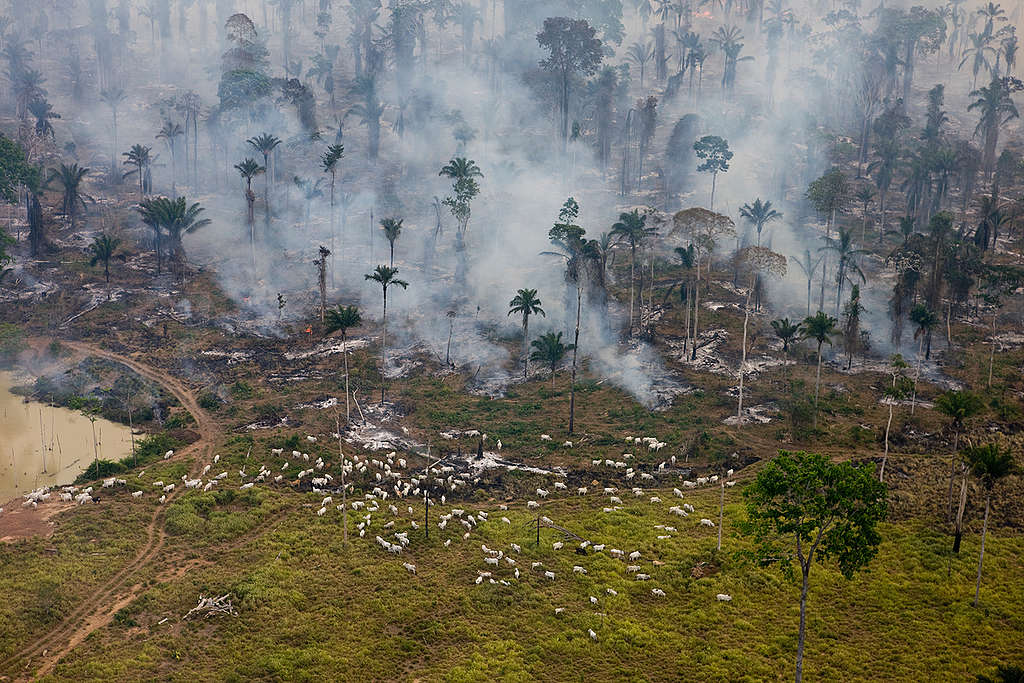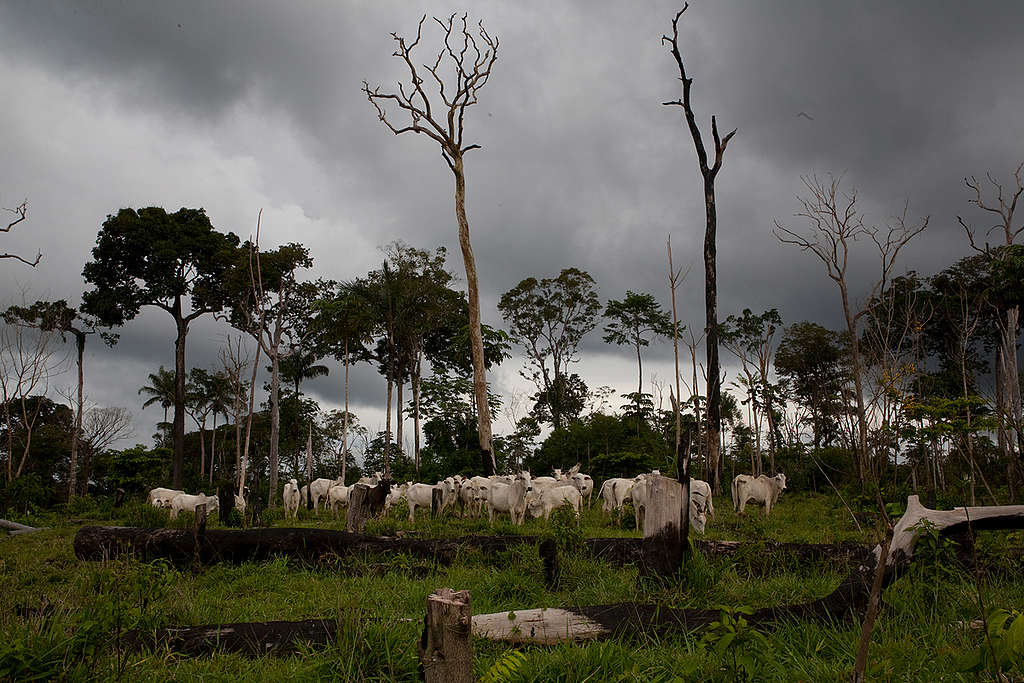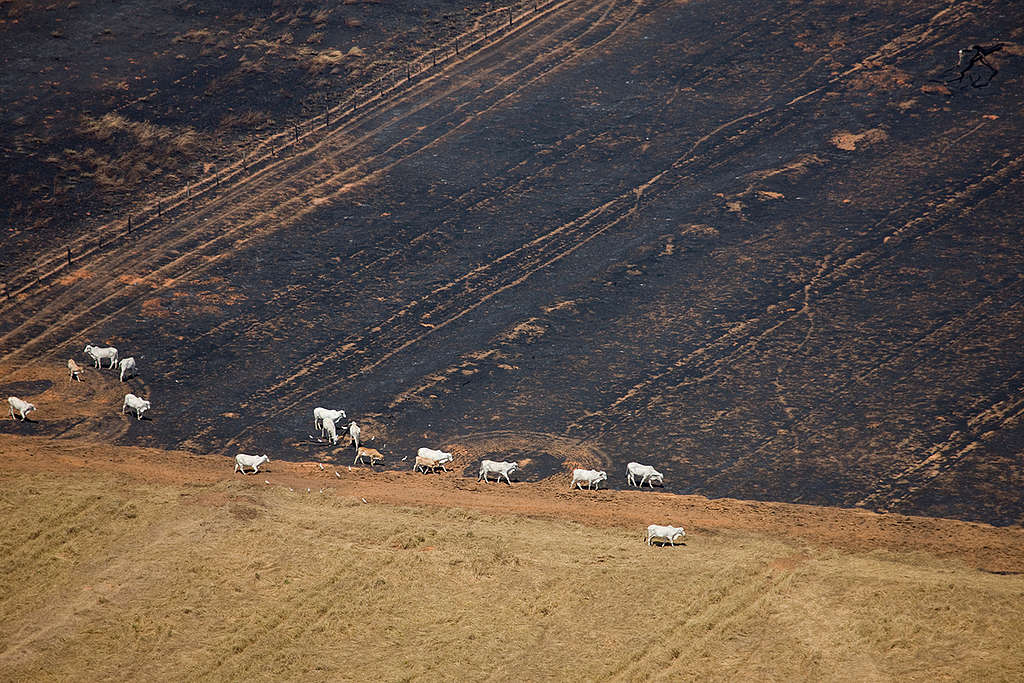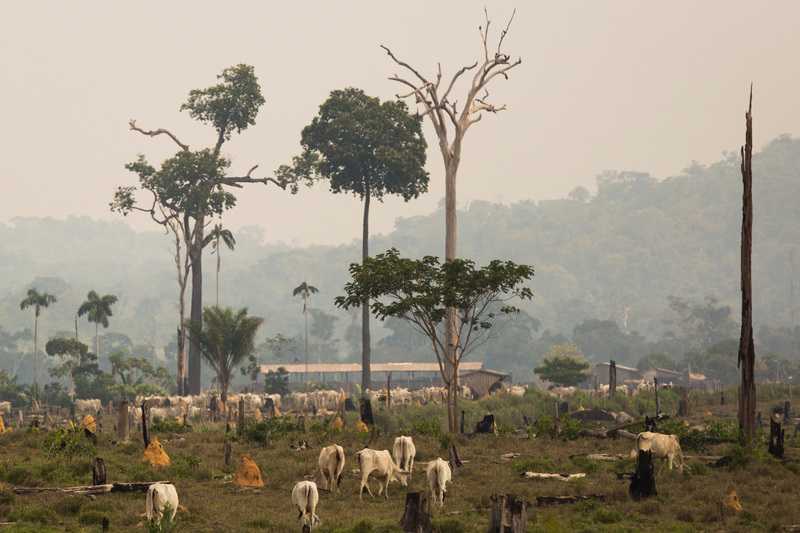Scientists couldn’t be more clear. For humanity to avoid climate
disaster and remain below the 1.5°C threshold set out in the 2015 Paris
Climate Agreement, society must radically transform. We need to change
our energy, transport, and food systems fundamentally and quickly.
Why
food? According to scientists from the UN’s Intergovernmental Panel on
Climate Change (IPCC), land use for farming is responsible for
one-quarter of all global greenhouse gas emissions (GHGs). Corporate
food giants like JBS, Tysons, AMD, Cargill and CP and others operate a
runaway industrial food system that gobbles up more and more land to
raise cows, pigs, and chickens and grow the maize and soya that feeds
them.

Livestock alone already accounts for 14.5 % of all global GHG emissions, according to the UN’s Food and Agriculture Organization (FAO). That’s the same amount as emissions from global transport. Also, industrial farming produces about half of global methane, 28 times more warming than CO2. Bottom line: If we don’t fix food, we don’t fix the climate, equity and justice.
This year, the UN convened the UN Food Systems Summit (UNFSS).
Announced in 2019, the UNFSS was billed as an ambitious attempt to
address food’s role in the climate crisis and reach the UN’s Sustainable
Development Goals to “feed the world.” Though launched with good
intentions, the organisers together with member states have made
critical errors.
First, organizers paid little attention to an
established “multilateral” approach where member states and civil
society organizations, like the Civil Society Mechanism (CSM), equally set the agenda on big summits. Instead, corporate food players like the World Business Council for Sustainable Development (which includes Danone, Nestlé, PepsiCo.), Google Food Services and the Consumer Goods Forum featured more prominently.

Second, crucial issues like the rights of local communities, Indigeneous Peoples, and smallholder farmers weren’t prioritized. The dominance of corporate players was so obvious that thousands of CSM members and affiliates boycotted the pre-summit and organized a counter-summit in protest, with the hashtag #FoodSystems4People.
After this week, UNFSS organizers will pass the various recommendations to UN food agencies and national governments to implement. But there are already signs that the summit outcomes won’t take the food-climate crisis as seriously as science requires.
The initial recommendations emerging from the UNFSS’ so-called “sustainable livestock cluster” advocates for industry-promoted technical fixes like genetically modified ‘ethiochicken’ to produce more eggs or ‘precision livestock farming’ to use big data to track herds in pastures and feedlots. Moreover, the recommendations skirt away from corporate accountability and the need for corporate transformation. None of the recommendations address the scientific imperative: we must drastically reduce our meat and dairy production and consumption and radically shift our food systems toward ecologically produced plant-rich diets.

According to Greenpeace’s definitive 2018 scientific report on livestock’s role in the climate crisis, we need a global reduction of 50% in production and consumption of meat and dairy products by 2050 to stay under 1.5°C. Why? Livestock is responsible for the majority of food’s GHG emissions. If left unchecked, agriculture is projected to produce 52% of global greenhouse gas emissions in the coming decades, 70% of which will come from meat and dairy, most of which produced unsustainably by corporate players.
But business as usual expansion is exactly what the livestock industry wants. Agribusiness industry groups like the Global Dairy Platform, International Meat Secretariat, International Poultry Council, and others are already lobbying the UN to form a ‘Coalition of Action on Sustainable Livestock’, dominated entirely by pro-livestock researchers and lobbyists. Greenpeace UK’s investigative arm, Unearthed, just published an expose showing how far the meat and dairy lobby is willing to go.
If successful, these livestock industry groups will continue setting the agenda and endlessly expand, pushing us toward a climate and public health disaster. More forests will be cleared for cattle and feed. Meat heavy diets will drive continued high rates of cancer, heart disease and obesity. Smallholder farmers, landowners, fisherfolk, Indigenous Peoples and the world’s impoverished will be left on the sidelines with no input.
The science is clear. To survive the climate crisis, we’ll need less land devoted to animal grazing and feed, not more. We need plant-rich diets, not meat-heavy diets that damage our health and planet. The UNFSS is creating the illusion of real action without addressing these inconvenient truths.

If governments want real solutions, they must amplify the voices of the small-scale producers and communities they claim to support. In pandemic times, they must support smallholder farmers, landowners, and Indigenous Peoples and push back on neocolonial food expansion. They must reverse the endless expansion of corporations into natural ecosystems and embrace ecological food systems that put food sovereignty and people’s wellbeing at the core.
The UN, national governments and corporations must listen to scientists and local communities and stand up to the industrial livestock lobby’s lie that only they can feed the world. They must decide if their legacy will be to fiddle while the planet burns.

No comments:
Post a Comment
Note: Only a member of this blog may post a comment.